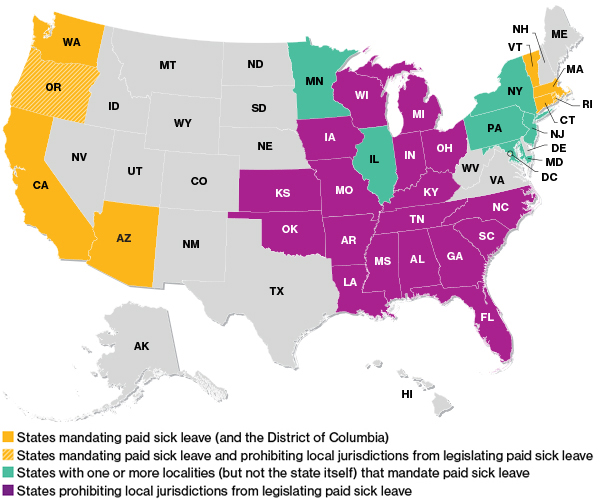
November 28, 2017 - Willis Towers Watson
By Cindy Brockhausen and Bill Kalten
Rhode Island has enacted the first paid sick leave law in 2017, joining seven states and over 30 localities with a paid sick leave law on the books.
Many other states have enacted gpreemptionh measures that ban local jurisdictions from enacting their own paid sick leave laws.
The law takes effect on July 1, 2018, and requires employers with 18 or more employees working in Rhode Island to provide up to 24 hours of paid leave in 2018.
Rhode Island has enacted the first paid sick leave law in 2017, joining seven states and over 30 localities with a paid sick leave law on the books. The new law takes effect on July 1, 2018, and requires employers with 18 or more employees working in Rhode Island to allow employees to accrue up to 24 hours of paid leave in 2018, 32 hours in 2019 and 40 hours in subsequent years. Based on the statutory language, it appears that employers with fewer than 18 employees working in Rhode Island will have to provide leave, but it need not be paid; future guidance should clarify this issue. The law also prohibits municipalities from establishing their own, more generous paid sick leave laws.
Many other states have enacted gpreemptionh measures that ban jurisdictions within their borders from enacting their own paid sick leave laws. Of the 20 states that have enacted such measures to date, only Oregon and Rhode Island have paired the local ban with a statewide paid sick leave mandate.
And although Rhode Island is the only jurisdiction that has enacted a paid sick leav law thus far this year, there has been a flurry of activity in many of the paid sick leave jurisdictions. Oregon, Vermont and Washington state; Chicago, Emeryville (CA), New York City and Tacoma (WA); and Cook County (IL) have either issued regulatory guidance or enacted amending legislation. Other jurisdictions, such as Arizona, are crafting regulations and/or FAQs.
The map below depicts the states with paid sick leave preemptions laws, and the ever-increasing patchwork of state and local paid sick leave laws, which will likely expand in the absence of a federal mandate. While support for paid sick leave legislation has never taken hold in the Republican Congress, the Workflex in the 21st Century Act — recently introduced by Representative Mimi Walters (R-CA) — might change the outlook for federal action. The bill proposes to shield employers from state and local paid leave requirements if they voluntarily offer employees a minimum amount of paid leave per year — scaled to employer size and employee tenure — and institute at least one of six voluntary flexible work arrangements, such as telework, job sharing and compressed scheduling.
Employers in states and localities with paid sick leave laws should review their leave policies and procedures to ensure they comply with the laws, and that their payroll records properly track the accrual and usage of paid sick leave. Federal contractors also need to comply with Executive Order 13706 and the related regulations. Employers should also monitor labor department websites in the paid sick leave jurisdictions relevant to their operations for any guidance or regulations.
Given the number and variety of paid sick leave laws, multistate employers may wish to consider crafting a uniform policy that satisfies the requirements in all the employerfs jurisdictions to reduce administrative complexity. One important factor would be whether the administrative benefits outweigh the additional costs associated with such a uniform policy.